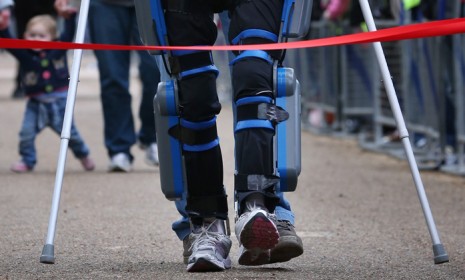The paralyzed marathoner with an incredible robot suit
After 16 days and 55,000 steps, a British woman paralyzed from the chest down crosses the London Marathon finish line... with a little bionic help

A free daily email with the biggest news stories of the day – and the best features from TheWeek.com
You are now subscribed
Your newsletter sign-up was successful
This week, a 32-year-old British woman named Claire Lomas crossed the finish line of the London Marathon. So did thousands of other people, but Lomas is special: She's paralyzed from the chest down. The former chiropractor was able to complete the grueling 26.2-mile journey with a little robotic aid in the form of the ReWalk system, a bionic exoskeleton that allowed her to walk again. Here, a brief guide to her extraordinary journey:
How was Lomas paralyzed?
In 2007, she was injured in a freak horseriding accident that left her with a broken neck, back, and ribs. "Of course I have bad days and difficult times," Lomas told ABC News. "But I just get through them, and gradually, things get better." Since the accident, Lomas "spent all her time in a wheelchair, at least until January," says Nick Schifrin at ABC News. "That's when she started walking again, thanks to a $75,000 bionic suit."
The Week
Escape your echo chamber. Get the facts behind the news, plus analysis from multiple perspectives.

Sign up for The Week's Free Newsletters
From our morning news briefing to a weekly Good News Newsletter, get the best of The Week delivered directly to your inbox.
From our morning news briefing to a weekly Good News Newsletter, get the best of The Week delivered directly to your inbox.
How does the suit work?
The exoskeleton consists of strap-on robotic limbs, a pair of crutches, button-bearing wrist straps, a computer, and sophisticated motion sensors that detect a user's shifts in balance and activate motors that power the robotic limbs forward, says Amar Toor at The Verge. The exoskeleton is juiced by a four-pound battery which the user carries in a backpack, and allowed Lomas to "stand, walk, and climb stairs." (Watch a video below.)
How long did it take her to finish?
Lomas' 26.2-mile race started on April 22, and she crossed the finish line 16 days and 55,000 steps later, on May 8, completing about a mile-and-a-half a day. "It was really emotional and I couldn't believe the support — I'm still in shock really," she told BBC News. "The last half a mile or so was pretty easy to walk because I had everyone pushing me forward."
A free daily email with the biggest news stories of the day – and the best features from TheWeek.com
Why did she do it?
The goal was to raise money for Spinal Research, a charity dedicated to medical research for the paralyzed. So far, Lomas has raised close to $130,000.
How is the world reacting?
With amazement, by and large. But the marathon itself didn't recognize Lomas' time — "marathon rules state that competitors must complete the race in the same day to receive one," says Anoosh Chakelian at TIME. Many incensed runners, however, were quick to offer Lomas their medals instead.
Sources: ABC News, BBC News, Discovery News, TIME, The Verge
-
 The Week Unwrapped: Have televised confessions quelled protests in Iran?
The Week Unwrapped: Have televised confessions quelled protests in Iran?Podcast Plus, why has Elon Musk turned from Mars to the Moon? And will the BBC prove to be a puzzles champ?
-
 The week’s best photos
The week’s best photosIn Pictures An Andean god, a rogue squirrel, and more
-
 ‘Zero trimester’ influencers believe a healthy pregnancy is a choice
‘Zero trimester’ influencers believe a healthy pregnancy is a choiceThe Explainer Is prepping during the preconception period the answer for hopeful couples?